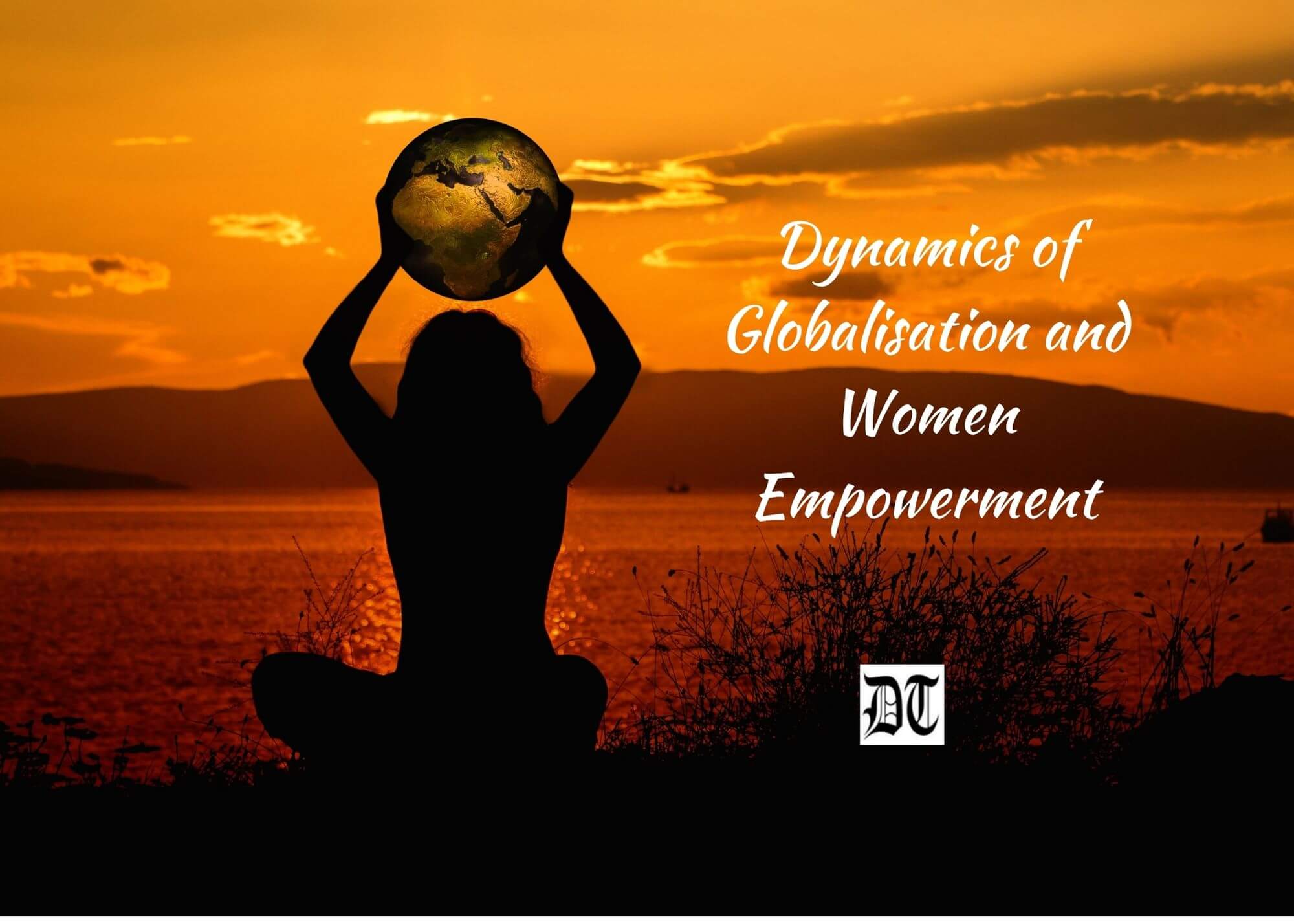The article focuses critical globalisation literature with feminist critiques about the gendered impact of globalisation. The feminist critiques of globalisation is of the view that “gender” is deep-seated in the logic and dynamics of globalisation. On the other hand, mainstream theories of globalisation consider it to be as gender-neutral phenomenon. Neoliberal and universalistic globalisation tend to pay little attention to gender and under represent the experiences of different women living in specific societal context especially those in developing world. Much of the theorising about globalisation is either gender neutral or gender blind losing sight of the fact as to how globalisation plays an important role in shaping gender relationship. The dialectics of globalisation makes us realise that it is an outcome of conflicting interactions between global and local political economies and socio-cultural conditions producing mixed outcomes. In the broadest sense, globalisation refers to the economic, social, cultural and political processes of integration that result from the expansion of transnational economic production, migration, communications and technologies. Here’s an in-depth research on the contestations and counter-contestations between globalisation and women empowerment, as special feature on the International Women’s Day, exclusively for Different Truths.

The article delves deep into the relationship between the two paradigms – “globalisation” and “women empowerment”. Though they are mutually reinforcing and interconnected yet they differ in significant ways. Each paradigm interacts with the other in order to establish a base for analysis.
The article focuses critical globalisation literature with feminist critiques about the gendered impact of globalisation. The feminist critiques of globalisation is of the view that “gender” is deep-seated in the logic and dynamics of globalisation. On the other hand, mainstream theories of globalisation consider it to be as gender-neutral phenomenon. Neoliberal and universalistic globalisation tend to pay little attention to gender and under represent the experiences of different women living in specific societal context especially those in developing world. Much of the theorising about globalisation is either gender neutral or gender blind losing sight of the fact as to how globalisation plays an important role in shaping gender relationship.
In most of the recent studies of gender issues there is an excessive tilt towards focusing the effects of globalisation on women instead of effects of gender on globalisation. Some of globalisation`s gendered effects are hardly observable particularly when the victims are the poor women of the third world, who are structurally marginalized, minimising those effects less apparent and less directly perceptible. Overlooking the needs of incorporating gender into the study of globalisation in a systematic and meaningful way not only give rise to an erroneous understanding of the source of gender inequality but also can debilitate the policies of development and translating them into practice. Hence the paradigm of gender counts much for a clear understanding as to what globalisation is and how does it get influenced by gendered hierarchies, connections, identities and experiences of men and women.
The study of “women empowerment” in the backdrop of globalisation has immense importance because the two concepts more or less stand opposed to each other. Hence a clear perception is needed about the two for better understanding of the issues related to globalization and women empowerment. Women empowerment signifies redistribution of power that challenges patriarchal ideology and male dominance. It refers to strategies that women use to increase their control of resources and generate decision-making capacity. The agenda of globalisation runs counter to the basic tenets of women empowerment that involves consolidation, solidarity and consensus strengthening organisational capacity of the women towards establishing a society based on equity and fairness. But globalisation, on the other hand, reflects globalising masculinities in terms of conquest, settlements and post-colonialism. Globalisation is a project where hegemonic transition of the world towards capitalism is enforced. As a sequel to this conscious design, considerable socio-cultural discontent erupted in the countries of global south worsening the conditions of the marginalised, particularly the women. The dialectics of globalisation makes us realise that it is an outcome of conflicting interactions between global and local political economies and socio-cultural conditions producing mixed outcomes. In the broadest sense, globalisation refers to the economic, social, cultural and political processes of integration that result from the expansion of transnational economic production, migration, communications and technologies.
Some cogent arguments can be put forward in the following manner to explain why there are marked differences between the paradigm of globalisation and the paradigm of women empowerment.
- The paradigm of globalisation nurtures a neo-liberal agenda of ruthless individualism. Whereas, the paradigm of women empowerment is wedded to the ideas and principles of collectivism. Collectivism is a basic cultural element that exists as the reverse of individualism
- Globalisation smacks of centralism. But the basic tenets of women empowerment advocate the agenda of redesigning power-structure in the society and reallocation of wealth and resources to engender an egalitarian society. Demand for the shift of wealth from the global north to global south constitutes one of the agenda of women empowerment. Globalisation, on the other, aims at hegemonic transformation of the world along the lines of capitalism which smacks of centralism.
- The agenda of global development of capitalism believes in the extraction of labour (particularly from poor paid women workers) to the maximum possible extent ensuring profit accumulation. The agenda of women empowerment opposes this agenda of globalisation tooth and nail.
- Globalisation is characterised by masculinities exposed through conquest, settlements, imperial empires and post colonialism. The agenda of women empowerment excludes all such hegemonic attitudes reflective of subjugation, domination and forceful compliance.
- The agenda of globalisation is characterised by shrinkage of rights and freedom of men and women as well reflected especially in the programs included in SAPS. On the other, the agenda of women empowerment strongly advocates extension of rights.
The paradigm of globalisation is wedded to the principles of neoliberalism marked by free market economy, free trade policies, cut-throat individualism, easing of restrictions on capital flow, privatisation of public assets, elimination of social welfare programmes, and restrictions on immigration. Most of the objectives will not come to any succor to women empowerment. Rather those agenda will pose challenges and threats to empowerment. The neoliberal agenda of globalisation is characterised by the sale of state owned enterprises, goods and services to private investors in the name of expanding markets and increasing efficiency. Structural Adjustment Program, an integral part of Neoliberal agenda, will definitely tell upon the interests of women empowerment. The World Bank and International Monetary Fund have required debtor nations to restructure their economies keeping parity with neo-liberal lines by government regulations, eliminating social welfare programs and promoting market competition. Elimination of social welfare programs will deal a death blow to women empowerment.

Though globalisation envisages an agenda of easing barriers to transnational trade in goods and services yet free flow of work force across trans-national border is not permitted, which comes in conflict with the agenda of promoting transnational culture, an avowed agenda of globalization. Feminist political philosophers are concerned with the gendered effects of SAP resulting reductions in publicly funded health services, education and child care undermining health and wellbeing programmes for the poor. The burden of SAPS is disproportionately borne by women. Cut in public health services led to the rise in maternal mortality.
The impacts of globalisation are felt at various sectors of societies differently. Men are benefited more from the pay-offs of globalisation in comparison to women, who become compelled to bear the brunt of discriminatory pay-offs. The inherent contradictions of globalisation are responsible for unequal pay-offs that trigger dilemmas, risks and shrinkage of rights which ultimately breeds inequality, poverty especially among the women of global south. Huge influx of female workers followed by feminization of labour force in micro level unorganised sectors and low-paid workers led to the rise of wage dependency, labour exploitation, and economic marginalisation impair further the already low status of women giving rise to inequalities based on race, gender, class and nationality in the global south.
According to the language of Global Intellectual Hegemony (GIH), globalisation is labeled as a new, modern and scientific phenomenon. GIH propagates the idea of competitive individualism and emphasises personal survival. An ideology of ruthless individualism cannot be of any help to women empowerment. Globalisation, opines feminist critics, is incongruous to women interest due to structural gender inequalities. Globalisation is projected as modern and scientific by the neo-liberal thinkers and capital as the driving force in globalizing countries. People across the world expected globalisation would be a catalytic agent for ushering in modernity keeping conservatism at bay. But these expectations were belied when we found that despite rapid changes in globalising economies of Asia, capital did not challenge patriarchy and its traditions. Rather it harnessed them for its own benefit. This reflects a gap between “globalisation as a theoretical construct” and “globalisation in real practice”. Here lies the difference between theory and praxis of globalisation exposing the inherent paradoxes of the paradigm. Like democracy, globalisation is a slippery word wearing different meanings in theory and in reality.
Alison M. Jaggar, a socialist feminist, once observed, “globalisation has promised many things that are crucial to feminists: peace, prosperity, social justice, environmental protection, the elimination of racism and ethno-centrism, and of course an increase in the status of women. However, neoliberal policies have brought the opposite of these aspirations. Rather than peace they have created conditions for war and increased militarism rather than prosperity and social justice, they have increased the gulf between the rich and the poor, rather than environmental protection they have led to privatisation and destruction of publicly owned natural resources, rather than eliminating racist, ethnocentric and sexist barriers —globalisation has been ultimately,” a system hostile and antagonistic to women.”1 The observations of Jaggar brings home the point that the upholders of the tenets of globalisation hardly attach importance to their declared goals of women empowerment. There is a gap between promulgation and execution of programmes.
Feminist theoretical approaches to globalisation enable us to have a clear perception of gender injustices associated with globalization. Analytical system or approach underlies scientific investigations. The theoretical approaches being used by the feminists aim at articulating and focusing the challenges posed by globalization against women. Far more than recognizing the importance of gender, the approaches with regard to globalisation require rethinking of how to conceptualise study and act in relation to globalisation. Methodological commitment shared by feminist approaches to globalisation is a consciousness to context and concrete specificity. One of the aims of feminist philosophy is to cogitate accurately the diverse interests, experiences and concerns of women throughout the world and to take note of the culture, history and socio-economic and political environment. In this way, the feminist approach to globalisation swings between local situations and global pressures, between historical realities and current experiences of oppression and vulnerability being attentive to interactions among social, economic and political factors.
It would be a retrograde step as to the forward march of human civilisation, if the immense potentialities and forces of globalisation are not taken with much care and considerations. Outright demonising of globalisation would be an erroneous step in political judgement.
Globalisation is definitely a revolution in the perspectives of communication, technology, and expansion of transnational economic production and migration. It is a process of social, economic and political integration. It connects people across national borders, creating trans-national communities.
Globalisation acts as a catalyst that magnifies both good and bad, depending on how it is harnessed, by whom and to what purposes. It would be an act of tomfoolery and futility if globalisation is opposed without its perspective being looked into even though it intensified power differentials that subjugate women.
It is high time for international women’s movement to mobilise and take lead in constructing a new political order best suited to a world being designed by globalisation. The global women’s movement can provide an alternative vision of power, offer a response to globalisation that draws on its strength and welcome a world bereft of boundaries and borders. This can be considered as a significant message to all women across the world on the occasion of the International Women’s Day.
Notes and References
- Globalisation: A secret weapon for feminists, Jessica Neuwirth (www.feminist.com)
- Good Governance, Democratic Societies and Globalization (eds. Surendra Munshi, Biju Paul Abraham)
- Development, Gender and Diaspora, Context of Globalization (eds.) Paramjit S.Judge, S.l. Sharma, Gurpreet BAL.
Picture design by Anumita Roy, Different Truths





 By
By

 By
By